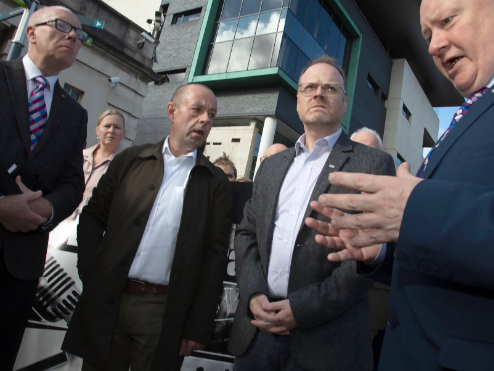
Two investigative journalists in Northern Ireland have said they feel like “pawns in a state attack on press freedom” as police further extend their bail over allegations they stole a confidential document.
Trevor Birney and Barry McCaffrey reported for police questioning on Friday following their arrest in August in connection with their work on the award-winning documentary film No Stone Unturned, released last year.
The pair were hoping to have the threat of prosecution against them lifted after the Northern Ireland Police Ombudsman said no complaint had been made by his office of a theft of confidential documentation.
Seamus Dooley, assistant general secretary of the National Union of Journalists, said the Police Ombudsman’s statement had removed the “central plank of this vindictive investigation”.
However on Friday, Birney (pictured, centre right) and McCaffrey (pictured centre left) had their bail extended until 1 March, which Dooley said was a “continued threat to the liberty of two investigative journalists”.
No Stone Unturned looked into the Loughinisland massacre in which six people were killed by loyalist gunmen while watching a World Cup football game in a bar on June 18 1994.
It broke new ground by publicly naming those it said were suspects and exploring claims of security force collusion with loyalist paramilitaries.
Tweeting on Saturday, McCaffrey said: “Can’t explain utter helplessness Trevor Birney and I feel as pawns in state attack on press freedom.”
He added that without support from NGOs, Dooley (pictured, far right), and their solicitors, the “state would have [the] key thrown away already”.
Around 50 journalists gathered outside Musgrave police station on Friday to show their support.
Speaking outside the station, Birney said the police decision had been a “complete farce”.
“I think that this is quite clearly punitive and an attempt to restrict both myself and Barry and the work that we’re trying to do and I think it’s just been another very frustrating day, not only for ourselves but for all our colleagues and those who we are trying to work for.”
Solicitor Niall Murphy added that it was “crystal clear” no offence has taken place.
Birney and McCaffrey were arrested on 31 August and questioned for 14 hours. Both had computers and data belonging to them seized, according to the NUJ.
Birney worked as a producer on No Stone Unturned and McCaffrey as a journalist. They were questioned over how material held by the ombudsman ended up in the documentary.
Birney said on Friday: “Ultimately this is all about the Lochlolland families. This really isn’t about us.
“But I think this farce today has just added to their grief and added to their concern that they are like a cork on the ocean being bobbed about by police forces both here and in Durham.”
The NUJ has called on the Tánaiste and Minister for Foreign Affairs and Trade, Simon Coveney, to intervene on the issue while Amnesty International warned freedom of the press in Northern Ireland is under threat.
Patrick Corrigan, the human rights charity’s Northern Ireland programme director, said: “Be under no illusion, the arrests of journalists and the seizure of their documents and computer equipment threatens press freedom in Northern Ireland.
“The arrest of two of the most widely respected journalists in Northern Ireland has sent a shiver of fear through media in the region.
“Journalists must be free to investigate and expose issues of public concern without fear of arrest. When the police are arresting journalists who have investigated police collusion in the killing of civilians, rather than the killers and their helpers, then we all should be deeply worried.
“Unless the police can demonstrate that the arrests and seizure of the journalists’ materials were reasonable, proportionate and necessary in a democratic society, their actions amount to an assault on the freedom of the press.”
Picture: Seamus Dooley
Email pged@pressgazette.co.uk to point out mistakes, provide story tips or send in a letter for publication on our "Letters Page" blog
